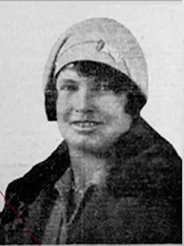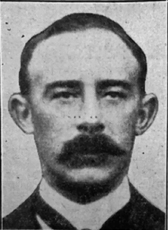
1886 - 1932
Summary
Name:
Daisy de MelkerYears Active:
1932Birth:
June 01, 1886Status:
ExecutedClass:
MurdererVictims:
3Method:
PoisoningDeath:
December 30, 1932Nationality:
South Africa
1886 - 1932
Summary: Murderer
Name:
Daisy de MelkerStatus:
ExecutedVictims:
3Method:
PoisoningNationality:
South AfricaBirth:
June 01, 1886Death:
December 30, 1932Years Active:
1932bio
Daisy de Melker was born as Daisy Hancorn-Smith on June 1, 1886, in Seven Fountains, located in what was then the Cape Colony. She was the daughter of a family with eleven children. When Daisy was twelve years old, she moved to Bulawayo in Rhodesia, now known as Zimbabwe. She went there to live with her father and two of her brothers.
Three years later, Daisy became a boarder at the Good Hope Seminary School in Cape Town. After some time, she returned to Rhodesia in 1903. Soon after, she moved to the Colony of Natal, where she enrolled at the Berea Nursing Home in Durban to train as a nurse.

During one of her holidays in Rhodesia, Daisy fell in love with Bert Fuller, a civil servant. They planned to marry in October 1907. Tragically, Bert became very ill with blackwater fever and died on the day they were supposed to get married, with Daisy by his side. He left behind a will that gave Daisy £100.
In March 1909, about a year and a half after Bert's death, Daisy married William Alfred Cowle, a plumber. At that time, she was 22, and William was 36. The couple had five children, but only one survived. Their first two children were twins who died in infancy. Their third child passed away due to an abscess on the liver. Their fourth child suffered from convulsions and bowel issues and died at just fifteen months old. Only their last child, Rhodes Cecil, who was born in June 1911, survived.
murder story
On the morning of January 11, 1923, William Cowle, Daisy de Melker's first husband, fell ill shortly after taking Epsom salts that she had prepared. The first doctor who attended him did not see the situation as serious and prescribed a bromide mixture. However, William’s health worsened quickly. He experienced great pain and alarming symptoms, leading Daisy to call for another doctor. When the second doctor arrived, William was foaming at the mouth and could barely respond, ultimately passing away in agony. This doctor suspected poisoning and refused to sign the death certificate. An autopsy later cited chronic nephritis and cerebral hemorrhage as the cause of death. Daisy, being the sole beneficiary, inherited a sum of £1,795.
Daisy married her second husband, Robert Sproat, on January 11, 1926. In October 1927, after suffering from severe pain and muscle spasms, Robert became very ill but initially recovered. He fell ill again after drinking beer while with Daisy and her stepson. Robert died on November 6, 1927. The attending physician declared arteriosclerosis and cerebral hemorrhage as the cause of death, and no autopsy was performed. After Robert's death, Daisy inherited over £4,000 along with an additional £560 from his pension fund.

Daisy married for the third time on January 21, 1931, to Sydney Clarence de Melker. In late February 1932, she obtained arsenic from a chemist while pretending to need it to treat a sick cat. A week later, on March 2, her son Rhodes fell ill after drinking coffee that Daisy prepared. A co-worker who shared some of the coffee also became sick but survived. Rhodes died on March 5, 1932. A postmortem was conducted, citing cerebral malaria as the cause of death. Daisy received £100 from Rhodes' life insurance shortly after his burial.
In April 1932, concerns raised by Daisy's former brother-in-law led to the exhumation of the bodies of her first two husbands and her son. Evidence was found indicating the presence of arsenic in Rhodes' remains and strychnine in the others. Daisy was arrested and charged with the murders of all three men. Public interest in the case grew, and the trial lasted thirty days. The crown's evidence included forensic findings and testimonies, but it was determined that the deaths of her husbands were not conclusively proven to involve foul play. However, the judge found overwhelming evidence that Daisy had murdered her son.
Daisy was ultimately convicted for the murder of Rhodes Cowle. She was sentenced to death by hanging, which was executed on December 30, 1932, at Pretoria Central Prison.